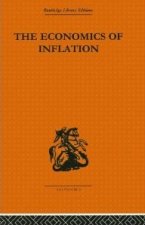The Economics of Inflation: A Study of Currency Depreciation in Post-War Germany
THE depreciation of the mark of 1914-23, which is the subject of this work, is one of the outstanding episodes in the history of the twentieth century. Not only by reason of its magnitude but also by reason of its effects, it looms large on our horizon. It was the most colossal thing of its kind in history: and, next probably to the Great War itself, it must bear responsibility for many of the political and economic difficulties of our generation. It destroyed the wealth of the more solid elements in German society: and it left behind a moral and economic dis- equilibrium, apt breeding ground for the disasters which have followed. Hitler is the foster-child of the inflation. The financial convulsions of the Great Depression were, in part at least, the product of the distor- tions of the system of international borrowing and lending to which its ravages had given rise. If we are to understand correctly the present position of Europe, we must not neglect the study of the great German inflation. If we are to plan for greater stability in the future, we must learn to avoid the mistakes from which it sprang.
There is another reason why the history of this episode is peculiarly significant to students of the social sciences. Accidents to the body politic, like accidents to the physical body, often permit observations of a kind which would not be possible under normal conditions. In peaceful times we may speculate concerning the consequences of violent change. But we are naturally precluded from verifying our conclusions: we cannot upset the smooth current of things for the advancement of abstract knowledge. But when disturbance takes place, it is sometimes possible to snatch good from evil and to obtain insight into the working of processes which are normally concealed. No doubt there are dangers here. We must not ignore the possibility that the processes thus revealed are themselves abnormal: we must not infer, for instance, that propositions which apply to large inflations neces- sarily apply, without modification, to small inflations. But the dangers are clear: it is not difficult to keep them in mind and to guard against them. And the opportunities of fruitful research are enormous. In this matter of the depreciation of the mark, there is hardly any branch of the theory of economic dynamics which is not illuminated by examination of its grim events.
For both these reasons, therefore, I hope that this book will obtain a wide circulation among the English-speaking public. Its distinguished author, Professor Bresciani-Turroni, had very special opportunities for writing it; for he was working in Berlin during the years in which the events he describes took place: first as a member of the Reparations Commission, then as head of the Export Control, and finally as economic advisor to the Agent-General for reparations. As they peruse the chapters in which he develops his beautifully lucid and essentially catholic explanations, many readers, I think, will feel that these appointments were among the few fortunate events of those troubled times. I hope they will feel, too, a debt of gratitude to the trustees of the Sir Halley Stewart foundation for the generous grant which made it possible to make available in the English tongue the results of such valuable researches and to Mr. and Mrs. Sayers for the pains they have taken with the exacting and time-consuming task of translation.
THE LONDON SCHOOL OF ECONOMICS
September 1937
LIONEL ROBBINS


 .
.